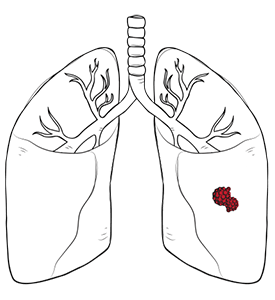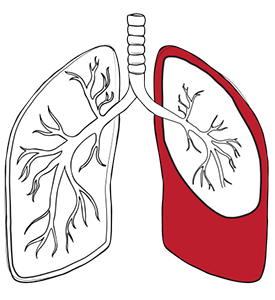

The pleural space lies between the lungs and the inner chest wall. In certain patients, an infection of the lung due to bacterial pneumonia or tuberculosis spreads and extends to this pleural space. Once the pleural space is infected, pus can accumulate, causing empyema thoracis. Occasionally, it can stem from an acute injury to the chest area.
It is an extremely dangerous disease and must be treated quickly to improve the odds of survival and decrease the chances of permanent lung damage.
There are several empyema thoracis symptoms. Shortness of breath is common, and as the pus solidifies, it covers the lungs making it harder to breathe. A cough that expels mucus or pus is a significant symptom, indicating liquid trapped in the pleural area. The infection can also result in a fever, night sweats, or chest pain.
One of the peculiar symptoms of empyema thoracis is unintended weight loss: patients with empyema experience a loss of appetite and struggle to eat. This is more common in cases of complex empyema, where the inflammation becomes more severe and the chest cavity can start to scar.
As mentioned, it’s important to get treated for empyema thoracis quickly before the condition worsens and risks permanent damage.
In some instances, empyema thoracis can result in sepsis. Sepsis is when your body’s immune system goes into overdrive trying to quell an infection, resulting in a high fever, confusion, difficulty breathing, and in its most severe cases, organ failure.
Empyema thoracis can also lead to a collapsed lung, due to the build-up of pus in the pleural space causing compression of the lung. A collapsed lung is a life-threatening event; it is best to do all you can to prevent it from occurring in the first place. If you suspect you have empyema thoracis, visit a medical specialist so they can diagnose your condition.

Your doctor will start by listening to your chest with a stethoscope for any abnormalities and consulting your medical history. If you had pneumonia recently, or are recovering from it, it increases the chances you have empyema thoracis.
Following this, your doctor will send you for a CT scan of the chest, and a blood test to check if you have an infection by monitoring your white cell count and inflammatory markers in the blood. In some cases, your doctor may choose to conduct a thoracentesis, extracting the fluid from the pleural space via a needle.
If it is determined you have empyema thoracis, treatment will be focused in two ways: removing the fluid from the lungs, and combating the infection with the latter usually involving antibiotics. Removing the fluid requires surgery, though the scale of the empyema thoracis surgery depends on the severity of your condition.
For some patients, it is a lighter surgery where the surgeon can drain the fluid via a needle or a chest tube from the patient’s chest. In other cases, a more extensive operation may be necessary after draining the fluid. One such surgery is lung decortication, where the surgeon drains the fluid and removes the infected material encasing the lung.
Neumark surgeons will perform a minimally-invasive thoracic surgery via a uniportal video-assisted thoracic surgery (U-VATS) approach, using the latest technology to ensure a successful treatment that is safe. Empyema thoracis can be treated safely and effectively, as long as you seek treatment quickly.
Empyema thoracis usually stems from a different disease affecting the lungs such as pneumonia. It can also occur after chest surgery.
Yes, you can be ‘cured’ from empyema thoracis, though it is vital you seek surgical treatment early to prevent the condition from having permanent effects. Through a combination of surgery and antibiotics, empyema thoracis can be cured, relieving your lungs from the pus and fighting the infection.
Empyema thoracis is a severe condition for all individuals, but it does have heightened risk factors. Patients who are immunocompromised are especially at risk, as their body will have a harder time fighting the infection. For that same reason, persons with diabetes are also at greater risk of permanent complications arising from empyema thoracis.
After completing a regime of antibiotics and your surgery, you may have to return for an additional X-ray to ensure all the infected fluid has been drained and the lungs have expanded well. It’s important to follow your doctor’s instructions during recovery to prevent further complications from arising post-surgery.
DISCLAIMER: The information provided on this website is for general informational purposes only and is not intended as a substitute for professional medical advice, diagnosis, or treatment. The use of this website does not create a doctor-patient relationship and no medical advice should be inferred or assumed. It is the user’s sole responsibility to seek the advice of their healthcare professionals for any medical concerns they may have and the user should not disregard, or delay, prompt medical advice for any such condition.
Neumark Lung and Chest Surgery Centre benefits from the expertise of a multidisciplinary team led by Dr Harish Mithiran, senior consulting thoracic surgeon at Gleneagles Hospital and Mt Alvernia Hospital.
Neumark is a lung and chest specialist centre with access to leading treatment modalities to achieve the best possible outcomes for lung disease and preventative patient screening.
Our foremost priority is to treat your condition as effectively as possible. Schedule a private consultation today; complete the form below, call, +65 6908 2145; WhatsApp, +65 9726 2485; or email, info@neumarksurgery.com.
Access the latest advice as well as full support throughout your treatment, and during after-care.
Learn how to refer a patient or to joining our physician network of leading providers in Singapore and abroad.
Main Surgery Centre
6 Napier Rd
#02-09 Gleneagles Medical Centre
Singapore 258499
820 Thomson Road
#06-07 Mount Alvernia Hospital Medical Centre A
Singapore 574623
Neumark Lung & Chest Surgery Centre benefits from the expertise of a multidisciplinary surgical team led by Dr Harish Mithiran, a senior consulting thoracic surgeon at Gleneagles Hospital.
With access to leading minimally-invasive treatment modalities for lung disease and chest conditions, our specialists in Singapore work to achieve the best possible outcomes for lung disease. Our foremost priority is to treat your condition as effectively as possible with world-class care.
6 Napier Road
#02-09 Gleneagles Medical Centre
Singapore 258499
820 Thomson Road
#06-07 Medical Centre A
Singapore 574623
© 2024 Neumark Lung & Chest Surgery Centre Pte. Ltd. | UEN 202136971R
Gleneagles Medical Centre
6 Napier Road
#02-09 Gleneagles Medical Centre
Singapore 258499
Mount Alvernia Hospital
820 Thomson Road
#06-07 Medical Centre A
Singapore 574623